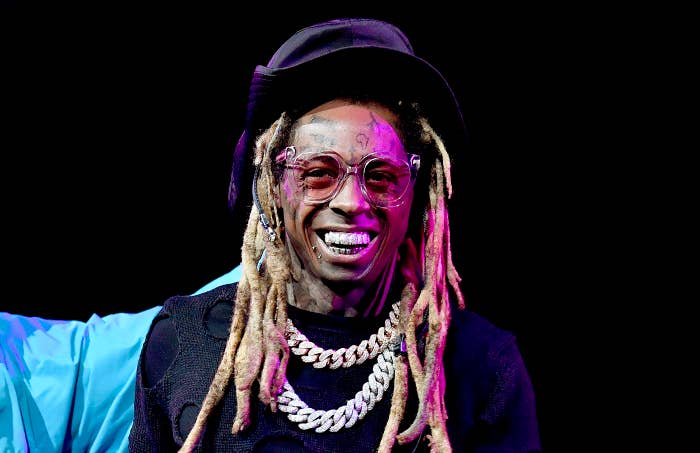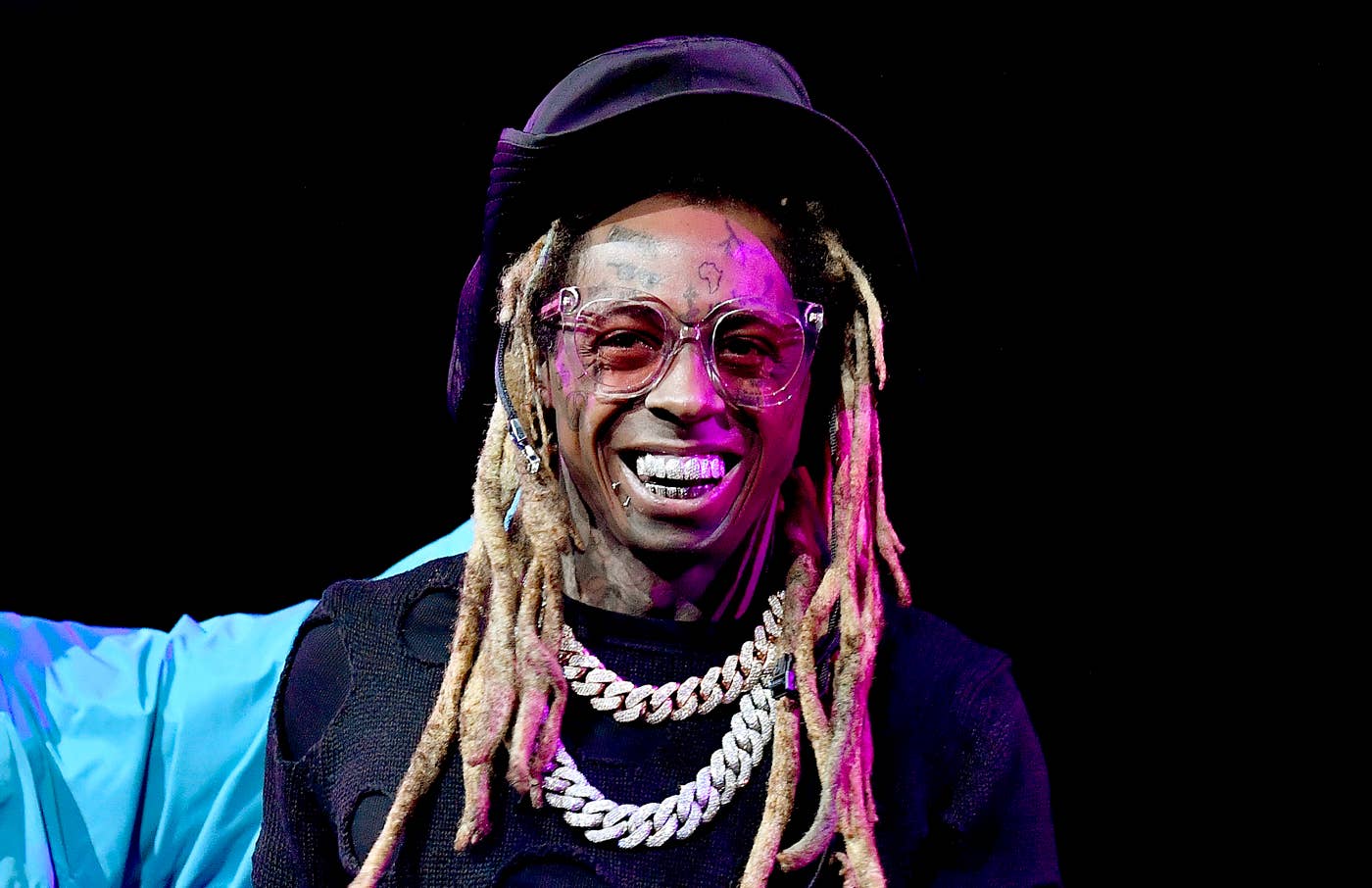
After a slight delay, Lil Wayne released his thirteenth studio album, Funeral, early Friday morning. The 24-song project features appearances from rappers like Lil Baby, 2 Chainz, and XXXTentacion, and production from Mannie Fresh, Murda Beatz, Mike Will Made-It, and more.
“With Funeral, we’re just playing off all this shit I’ve already dropped,” he told Drink Champs. “I’ve already dropped Rebirth, so now we’re going to the Funeral.”
Leading up to the release of the album, Wayne spoke about how Funeral would sound more current. “What the new thing is for me is actually trying to put out music that sounds a little more like today’s music,” he explained to New Orleans radio station Q93.3. “What that means for me… is adding hooks. I forget about hooks. I forget ’em. Somebody gotta come in the booth and stop me from rapping, like, ‘This is where you stop it and add a hook.’”
So, did he pull it off? What will Funeral add to (or detract from) his legacy? After a few spins this morning, the Complex Music team put together a list of first impressions and key takeaways from Lil Wayne’s new album.
Lil Wayne is operating in his own world
Late Thursday night, a two-hour Drink Champs interview with Lil Wayne debuted on TIDAL. In it, we learn some important things:
- Lil Wayne doesn’t know what Kanye West’s Sunday Service is.
- He admits that he once thought 21 Savage was a group.
- He doesn’t immediately recognize what the words “TDE” and “Quality Control Music” mean.
- He doesn’t know why Pusha-T doesn’t like him.
Wayne has admitted before that he doesn’t listen to any new music besides his own, but it’s now clear just how unplugged he is from everything else happening in rap right now. He excitedly spends a few minutes of the interview talking about all the time he’s been spending watching World War II footage on the History Channel, but admits to being disconnected from the online rap conversation. At one point, he even reveals that he just learned how to DM.
In turn, Funeral doesn’t spend any time commenting on current rap discussions. There are no antagonistic, Eminem-style barbs at critics of his work or other rappers. There is no J. Cole-style commentary on rap’s newest generation of stars. Instead, it’s clear that Wayne did what he’s always done: lock himself in the studio and make a bunch of songs that exist in his own self-contained universe. —Eric Skelton
It starts out strong
Funeral gets off to a good start. After opening the album by rapping over cinematic production on the dramatic title track, a couple well-timed lighter flicks introduce us to an early favorite: the Mannie Fresh-produced “Mahogany.” We’ll never get tired of hearing collaborations between these two, and it’s clear Mannie can still pull the best out of Wayne (he also produced late-album standout, “Piano Trap”). Then Wayne blacks out over wild electronic production on “Mama Mia” before connecting with Lil Baby and Big Sean on “I Do It.” At this point in the album, he successfully pulls off his mission to “sound a little more like today’s music” while still holding on to the idiosyncrasies that we love about Lil Wayne. —Eric Skelton
It loses focus in the middle
After a strong start, Funeral digresses in the middle. On songs like “Dreams” and “Stop Playin With Me,” he leans on AutoTune for melodic cuts that aren’t horrible (but certainly not memorable). Then he wanders all over the stylistic map, playing with bounce music on “Clap For Em,” trying his hand at pop on the regrettable Adam Levine-assisted “Trust Nobody” (more on that later), and dabbling in lo-fi, bass-heavy rap on songs like “Get Outta My Head” and “Bastard (Satan’s Kid).” At this point on the tracklist, it becomes clear Funeral isn’t an album that’s focused in one direction, but rather a grab-bag of sounds and styles. With a little more quality control, this could work, but there are several songs here where Wayne doesn’t sound inspired by the music he’s rapping over, which detract from the moments where he’s more locked-in. At times, you can’t help but think: Couldn’t Wayne have found better beats from more established producers? He picks up momentum again near the end of Funeral with songs like “Piano Trap” and “Darkside,” but the meandering middle section of the album bogs everything down. —Eric Skelton
All of Wayne’s eras are represented
Wayne pulls inspirations from all of his musical eras on Funeral. Tracks like “Mahogany” and “Mama Mia” appear to channel Tunechi’s early mixtape days, starting the tracks with lighter flicks and aggressive bars, with little to no hooks. Later, he moves to melodic tunes like “Sights and Silencers” and “Nobody,” which recall his AutoTune-heavy days. Then he brings us back to his experimental rock era with tracks like “Dreams” and “Get Outta My Head.” Of course, attempting to highlight all of his different facets provides a challenge he doesn’t always conquer. The traditional (by Wayne standards) rap songs prove he’s still an incredibly skillful rapper, but the constant switch-ups between styles does cause the album as a whole to sound disjointed. There are some great songs that show the best of each of Wayne’s abilities, but Funeral lacks cohesion as a result. —Jessica McKinney
There are Kobe tributes throughout
Lil Wayne appears to pay homage to Kobe Bryant multiple times on Funeral. On “Ball Hard,” he explicitly name-drops Black Mamba on the chorus. The lyric was likely always in the song, but in the wake of the NBA star’s untimely death on January 26, many have speculated that Wayne added other final touches prior to the album’s release in honor of Kobe. Fans first noted the 24-second pause at the end of “Bing James,” which is an ode the jersey number KKobe wore from 2006 until his retirement in 2016. “Bing James” is also eighth song on the tracklist, which may be Wayne’s way of paying homage to Kobe’s first jersey number, which he wore when he first entered the NBA in 1996 until he switched to No. 24. Finally, Funeral is 24 songs long. Wayne has not commented on the album’s length, and it is unclear how many songs he may have added to hit this number (if any at all), but this is likely another tribute to Kobe’s NBA career. While none of these details have been confirmed, it isn’t surprising that Wayne is showing his respect for Kobe in response to this week’s tragic news. Wayne and Kobe have frequently shared admiration for one another throughout the years. In 2009, Wayne dropped “Kobe Bryant” where he rapped, “He the greatest on the court and I’m the greatest on the verse.” —Jessica McKinney
It’s feature-heavy (but missing some heavy-hitters)
It’s Weezy F. Baby, and the “F” is still for a whole lot of features. Similar to 2018’s Tha Carter V,Funeral has double-digit guest features. Some of these appearances are expected. Wayne previously confirmed Big Sean and Lil Baby were on the album. And seeing artists like 2 Chainz and XXXTentacion pop up on tracks makes sense, considering their history (Wayne was the best man at 2 Chainz’ wedding and XXXTentacion have several collabs out already). There are some collaborations that surprised us, though. “Trust Nobody” featuring Adam Levine is probably the weirdest collaboration on the album, and feels entirely out of place. We also didn’t expect him to call on Takeoff for a guest verse, without the rest of the Migos. Despite all the features, there are some collabs that didn’t make the album that we would have liked to see. On Drink Champs, Lil Wayne alluded to Young Thug being on the album, saying, “[Young Thug] might be there,” but that turned out to be a lie. It’s also a little surprising that the only Young Money affiliate on Funeral is Lil Twist. Neither Nicki Minaj or Drake scored a spot (instead, Drizzy released his own single with Future on the same day). Other heavy-hitter collaborators he’s worked with frequently (like Kendrick Lamar) are also nowhere to be seen. It’s worth mentioning that Lil Wayne revealed during his 2018 CRWN interview that Mack Maine was heavily involved in the feature selection process for C5, so it wouldn’t be surprising if that same process played a role on Funeral. —Jessica McKinney
Adam Levine needs to stop collaborating with rappers
As we’ve hinted at throughout this piece, the most head-scratching song on Funeral is Wayne’s collaboration with Maroon 5 frontman Adam Levine on “Trust Nobody.” Anchored by an acoustic guitar and nauseatingly sugary melodies from Levine, the song feels like a soulless attempt at radio play, which will almost certainly never end up on the radio. We wish this one didn’t happen. And while we’re on the topic, we wish Levine would stop collaborating with rappers in general. After similarly regrettable collaborations with Kendrick Lamar, 50 Cent, Wiz Khalifa, and more, let’s hope he’s finally had his fill of half-baked rap crossover moments. —Eric Skelton
Wayne’s technical abilities are still sharp in Funeral’s best moments
Did Lil Wayne go a little overkill with 24 tracks? Yes. But even when the production falters or the hooks aren’t memorable, Funeral is filled with verses that prove Lil Wayne can still rap his ass off when he wants to. At moments, on tracks like “Mahogany,” accompanied by longtime collaborator Mannie Fresh, he invokes the feeling of peak-Wayne. At 37 years old, he might not be as untouchable as he once was, but he hasn’t lost his abilities as a rapper when he’s fully locked in. The album’s biggest problems come from overall production issues and album cohesion—not Lil Wayne’s rapping. —Kemet High
Overall thoughts
Don’t pay attention to what you’ve been reading on Twitter. Funeral isn’t trash or classic. It certainly won’t climb to No. 1 on the list of Best Lil Wayne Albums, and it likely won’t end up adding much to his overall legacy, but it’s not a complete waste of time, either. There are a handful of gems on here that we’ll add to playlists, and move on. You get the feeling most of us won’t spend much time revisiting the rest of the album in future years. So, why did he feel compelled to make it? As he repeatedly explained on Drink Champs, Wayne still lives in the studio. He still loves making music, and he wants to keep releasing it. Sure, he could use some self-editing, but his love for the sport of it all comes through on Funeral’s best moments. If you haven’t given it a spin for yourself yet, don’t expect an album of the year contender, but there are some enjoyable moments that make it worth a listen. —Eric Skelton

